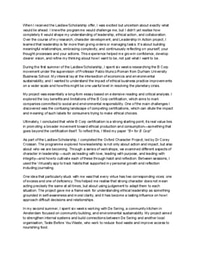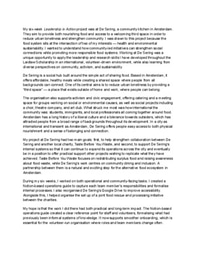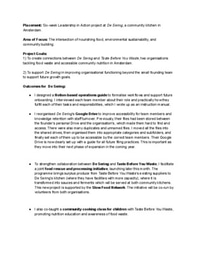LIA Reflection
My six-week Leadership in Action project was at De Sering, a community kitchen in Amsterdam. They aim to provide both nourishing food and access to a welcoming third space in order to reduce urban loneliness and strengthen community. I was drawn to this project because the food system sits at the intersection of two of my interests — health and environmental sustainability. I wanted to understand how community-led initiatives can strengthen social connections while promoting more responsible food systems. Working at De Sering was a unique opportunity to apply the leadership and research skills I have developed throughout the Laidlaw Scholarship in an international, volunteer-driven environment, while also learning from diverse perspectives on community, activism, and sustainability.
De Sering is a social hub built around the simple act of sharing food. Based in Amsterdam, it offers affordable, healthy meals while creating a shared space where people from all backgrounds can connect. One of its central aims is to reduce urban loneliness by providing a “third space” — a place that exists outside of home and work, where people can belong.
The organisation also supports activism and civic engagement, offering catering and a meeting space for groups working on social or environmental causes, as well as social projects including a choir, theatre company, and art club. What struck me most was how international the community was: students, immigrants, and local professionals all coming together around food. Amsterdam has a long history of a liberal culture and a tolerance towards outsiders, which has attracted people from a broad range of backgrounds throughout its development. In a city as international and transient as Amsterdam, De Sering offers people easy access to both physical nourishment and a sense of belonging and connection.
My project at De Sering had two main goals: first, to help strengthen collaboration between De Sering and another local charity, Taste Before You Waste, and second, to support De Sering’s internal systems so that it can continue to expand its operations across the city and eventually be in a position to offer practical support other projects wishing to replicate what they have achieved. Taste Before You Waste focuses on redistributing surplus food and raising awareness about food waste, while De Sering’s work centres on community dining and inclusion. A partnership between them is a natural and exciting step for the alternative food ecosystem in Amsterdam.
During my six weeks, I worked on both operational and community-facing tasks. I created a Notion-based operations guide to capture each team member’s responsibilities and formalise internal processes. I also reorganised De Sering’s Google Drive to improve accessibility. Alongside this, I helped organise the set up of a joint food rescue and processing initiative between the charities.
My hope is that the work I did there had both practical and long-term impact. The Notion-based operations guide created a clear reference point for staff and volunteers, formalising what had previously been informal systems of knowledge. It now supports smoother onboarding, which is essential for the volunteer-run organisation where roles and team members change often. Similarly, the restructured Google Drive file storage systems have improved day-to-day efficiency for the admin team.
The most exciting and rewarding project outcome was helping to establish a joint food rescue and processing initiative between De Sering and Taste Before You Waste. This programme is receiving funding support from Slow Food International and will redirect surplus produce to De Sering’s kitchen, where it is transformed into sauces and ferments for community meals. It represents a sustainable partnership model that will continue beyond my placement.
Working at De Sering gave me the chance to experience daily life in Amsterdam rather than as a tourist. The environment was highly international — almost everyone I met had come to the city from elsewhere to study or work. I was struck by how intentionally it functioned as a “third space”, and after this experience, I will seek out similar projects around where I am living. The experience has helped me think differently about community and belonging. I think people either expect to find it by stumbling across it one day, or that it should be something that just happens. Now I view it as something that is co-created and built.
Working alongside people with such varied backgrounds, values, and experiences gave me the opportunity to listen actively to people and stories I would not normally or otherwise have heard. I was exposed to new ideas about activism, political philosophy, and environmentalism that challenged and broadened my thinking. I came to understand how important accessible, community-driven spaces are in building social resilience, particularly in fast-paced urban environments where isolation is becoming more prevalent.
Overall, this experience gave me the opportunity to deepen my understanding of leadership as a process of enabling others and strengthening communities. It showed me that sustainable impact grows from inclusion, shared purpose, and collective responsibility. These lessons will guide how I approach future projects — with a focus on collaboration, accessibility, and long-term sustainability.



Please sign in
If you are a registered user on Laidlaw Scholars Network, please sign in